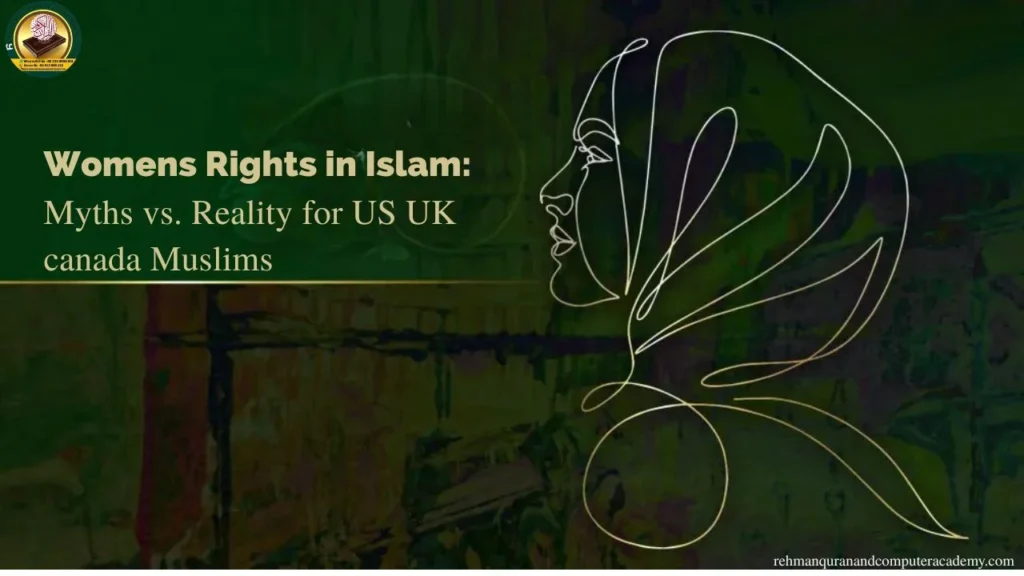
Understanding Womens Rights in Islam
The topic of womens rights in Islam sparks curiosity worldwide, especially among Muslims in the US, UK, and Canada. Many wonder how Islamic laws on women align with modern values. Islam offers a framework that honors women in Islam, balancing rights and responsibilities. This article explores the status of women in Islam, clears up misconceptions, and shows how Muslim women in Western countries live out these rights in Islam. By studying the Quran and Hadith, we uncover the truth about women’s Islamic rights and their practical application.
Historical Context of Womens Rights in Islam
Before Islam, women in the west and Muslim countries like pre-Islamic Arabia faced harsh conditions. Women without property or choice were common. Early Islamic history changed this. The Prophet Muhammad introduced reforms, giving women’s rights like owning property and consenting to marriage in Islam. Allah revealed verses in the Quran ensuring women are given fair treatment. For example, Islamic history records Muslim women like Khadija, a businesswoman, as proof Islam teaches respect for female rights in Islam. These changes set a foundation for women throughout the Muslim world, shaping women in Muslim societies today. Muslim jurists and scholars of Islam built on this, making Islam a pioneer in women’s rights.
Importance of Authentic Sources (Quran and Hadith)
The Quran and Hadith are the heart of Islamic jurisprudence, defining rules for women in Islam. They clarify rights of women in Islam, like spiritual equality and legal rights. Muslim scholars stress studying these texts to avoid misconceptions. For Muslims in the US, UK, and Canada, services like Quran Tafseer and Hadith & Fiqh Studies from Rehman Quran and Computer Academy help. These courses let female Muslim learners read the Quran and understand Islamic text, ensuring every Muslim grasps womens rights in Islam religion. Proper knowledge counters false ideas about Islam and women’s rights.
Core Rights of Women in Islam
Islam grants Muslim women clear specific rights, rooted in Islamic law. These cover spiritual, family, economic, and social areas, showing Islam considers women’s rights equal to men in many ways.
Spiritual and Religious Rights
Islam teaches that God created men and women equal in faith. Whether male or female, all can pray, fast, and seek knowledge. Muslim men and women have equal spiritual duties. Women in Islam rights include leading prayers at home or learning Quran and the Sunnah. Rehman Quran and Computer Academy offers Quran with Tajweed, Quran Memorization (Hifz), and Basic Salah Course to help women seek spiritual growth. These programs ensure female Muslim scholars and learners can deepen their faith, proving Islam places value on women’s Islamic rights.
Marital and Family Rights
Marriage in Islam protects Islam rights of wife through a marriage contract. Women have the right to consent, receive dowry, and expect support from the husband to his wife. Rights of a woman in Islam marriage include fair treatment and respect, as Islam prohibited mistreating husband and wife. The Quran and Hadith outline these marital rights, like mutual care, even if marriage to non-Muslims is restricted. Quran Translation courses help Muslim families understand verses like those in the chapter of the Quran about due rights, ensuring women are also respected in family roles.
Economic and Property Rights
Islam gave women inheritance rights and the ability to own property, unlike many secular women in early history of Islam. According to Islamic law, womens rights in Islam include keeping earnings and managing wealth. Muslim jurists confirm women are not allowed to be forbidden to inherit women’s shares. Medieval Islamic records show women in Muslim societies trading and owning land. Islamic Education courses teach Muslim women about these legal rights, helping them apply principles of Islamic finance in modern life.
Educational and Social Rights
Islam and Muslims encourage women go to school and engage in society. The Prophet urged man or woman to seek knowledge. Women played key roles throughout Islamic history, like Aisha, a scholar. Women in Islam can lead, vote, and work, as seen in Muslim countries. Arabic Language Training and Basic Islamic Education from Rehman Quran and Computer Academy support female rights in Islam, teaching Muslim community members about their rights that women hold socially and culturally.
Addressing Misconceptions About Womens Rights in Islam
Many misconceptions about womens rights in Islam exist, especially in women in the west. These myths misrepresent Islamic laws on women and Islam on women’s rights.
Myth: Women Lack Autonomy in Islam
Some claim Muslim women lack freedom. Yet, within the Islamic framework, women have the right to choose spouses, work, and own property. The Quran and Hadith grant rights of women like decision-making, as Islam teaches autonomy whether male or female. Quran Reading and Quran with Translation courses clarify these women rights in Islam, showing Islam considers Muslim men and women equal in agency. Important women in Islamic history, like Fatimah, prove this.
Myth: Hijab and Niqab as Oppression
The niqab vs hijab debate often labels modesty as restrictive. When can a woman take off her hijab? In private or with close family, as Islamic scholars explain. Islam sees Muslim women’s dress as empowerment, protecting dignity. Basic Islamic Education teaches Muslim community members about rules for women in Islam, showing women’s Islamic rights include choosing modesty freely, not as oppression.
Myth: Limited Roles in Society
Some think women in Islam rights limit them to homes. Early Islamic history shows female Muslim scholars like Aisha teaching Hadith. Today, women in Muslim societies lead in politics, education, and more. Online Quran Classes connect Muslim women globally, fostering roles within the Muslim community and proving Islam and women’s rights align with active participation.
Womens Rights in Practice for Western Muslims
Muslims in the US, UK, and Canada blend rights in Islam with Western life, applying Islamic perspective to daily challenges.
Balancing Faith and Western Culture
Muslim women in women in the west balance Islamic values with local norms. General Basics & Manners courses teach Muslim families how to uphold womens rights in Islam while respecting diversity. Islam teaches harmony, ensuring Muslim men and women thrive in secular women’s societies without losing faith.
Legal Protections and Islamic Rights
Western laws often align with Islamic law on women’s rights. Inheritance rights and marital rights are protected in both. Hadith & Fiqh Studies help Muslims understand Islamic jurisprudence, ensuring female rights in Islam like property ownership match legal systems in the US, UK, and Canada.
Learning and Empowering Through Islamic Education
Education empowers Muslim women to know their rights of women in Islam. Rehman Quran and Computer Academy offers tools for this.
Role of Quran and Arabic Studies
Quran Recitation, Quran with Tajweed, and Arabic Course help women in Islam learn their rights in the middle east and beyond. These courses let female Muslim learners study Islamic text, understanding status of women in Islam directly from Quran and the Sunnah.
Online Learning for Accessibility
Busy Muslim women benefit from Learn Quran Online and Read Live Quran. These flexible options suit US, UK, and Canada lifestyles, helping women seek knowledge about womens rights in Islam religion from home.
Resources for Further Exploration
For deeper study, Muslims can explore womens rights in Islam pdf and books.
Recommended Books and PDFs
Authentic resources like womens rights in Islam book or Read Live Quran PDFs from Rehman Quran and Computer Academy clarify rights of women. These tools help Muslim scholars and learners study Islamic perspective on women rights.
Quotes from Quran and Hadith
Womens rights in Islam quotes like Quran 4:1 (“God created men and women”) show equality. Quran Tafseer courses explain these, teaching Muslim women their due rights as Islam teaches.
Frequently Asked questions about Womens Rights in Islam
What are womens rights in Islam according to the Quran and Hadith?
The Quran and Hadith outline womens rights in Islam, granting Muslim women rights like owning property, seeking education, and choosing a husband. Islamic text like Quran (4:32) says men and women earn rewards equally, showing spiritual equality. Prophet’s Hadith teaches kindness to wives, ensuring legal rights and protection within Islam.
Did women have rights in early Islam or during the Islamic Golden Age?
Early Islamic history gave women rights absent in pre-Islamic Arabia, like inheritance rights and marriage consent. Throughout Islamic history, female Muslim scholars like Aisha thrived in the Islamic Golden Age, teaching Hadith and shaping the Muslim community. Women played key roles, proving Islam valued their status.
Do men and women have equal rights in Islam?
Rights of women in Islam marriage include consenting to the marriage contract, receiving Mahr, and being supported by the husband. Islam rights of wife ensure respect, as Quran (4:19) urges kindness. Women can set conditions, like education, in marriage in Islam.
What are the rights of a woman in Islamic marriage?
Rights of women in Islam marriage include consenting to the marriage contract, receiving Mahr, and being supported by the husband. Islam rights of wife ensure respect, as Quran (4:19) urges kindness. Women can set conditions, like education, in marriage in Islam.
Can a wife say no to her husband in Islam?
Within the Islamic framework, a wife can refuse marriage to non-Muslims or unwanted partners, as Islam prohibited forced unions. According to Islamic law, women have rights and responsibilities to voice preferences, ensuring mutual respect between husband and wife in the Muslim community.
When did women get rights in Islam, and how does it compare to the West?
Islam honored women with rights from its start in the 7th century, unlike women in the west who gained legal rights later (e.g., voting in the 19th-20th centuries). Quran and the Sunnah gave women inheritance and marital rights, far ahead of many secular women’s rights.
What are the biggest misconceptions about womens rights in Islam?
Misconceptions about womens rights in Islam include beliefs that Islam oppresses women or limits their rights. Muslim scholars clarify that Islamic law grants women due rights, like property and education, often confused with cultural practices in Muslim countries, not teachings of Islam.
Do women have more rights in Islam or Christianity?
Comparing womens rights in Islam to Christianity depends on context. Islam grants women specific rights like inheritance and marital rights, similar to Christian teachings of equality. Islamic perspective emphasizes women’s spiritual and practical rights, often matching or exceeding women in Muslim societies under Christian laws.
Are Muslim women oppressed, or is it a cultural misconception?
The idea that Muslim women are oppressed is a misconception often tied to cultural norms, not Islam. Quran and Hadith promote women’s Islamic rights, like education and property. Islamic feminist views show women thrive in Muslim families, supported by scholars of Islam.
Why do many women choose to convert to Islam if it’s considered oppressive?
Women seek Islam for its principles of Islamic fairness and spiritual depth. Female rights in Islam, like legal rights and respect as mothers, attract women throughout the Muslim world. Women are also drawn to read the quran and join Muslim communities, finding empowerment in Islam’s teachings.
Conclusion: Empowering Women Through Knowledge
Womens rights in Islam are robust, rooted in Quran and Hadith. From marital rights to inheritance rights, Islam honored women with specific rights. Misconceptions about womens rights in Islam fade with knowledge. Muslim women in the US, UK, and Canada can join Rehman Quran and Computer Academy’s Kalimas & Namaz or Special Islamic Courses to learn their rights in Islam, empowering them to live confidently within the Muslim community.

